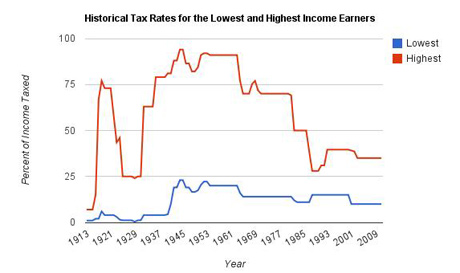InvisibleBlack
Posts: 865
Joined: 7/24/2009
Status: offline

|
quote:
ORIGINAL: Brain
Krugman won the Nobel Prize in economics for a reason and I think it makes him the most qualified to get the economy moving in the right direction. And if he's not, we will at least find out if those guys that decide who gets a Nobel Prize know what they're doing.
This does not necessarily follow. There are conservative economists who disagree with Krugman who've also won the Nobel Prize in economics.
Krugman's work was in New Trade Theory - specifically in economies of scale and network effect. This does not necessarily make him an authority on taxation or domestic public policy and economic output. It does mean he can probably offer some valid insights on trade, tariffs and protectionism.
quote:
ORIGINAL: kalikshama

This chart really isn't all that useful. It's showing you the "official" tax rates - which no one ever pays. If you want to do any sort of valid regressive analysis, you need to look at the "effective" tax rates and at the amount of revenue collected, sorted by tax bracket.
To take a truly radical position, I think that tax rates (by which I mean income tax rates) are probably about right. Changing them a point of two here or there aside, I do not believe that radical changes in the tax rates will have any benefit. I don't believe that raising the upper tax rates will result in significantly more revenue, nor that lowering them further will result in any increased economic output.
When discussing tax policy, the first thing that needs to be clarified is whether your goal is maximum revenue generation or fairness. This is critically important. There is a point where one is collecting the maximum amount of tax revenue possible but this point is most likely not one that most people would consider fair. This is actually a concept that many people have difficulty accepting or working with.
Massively increasing taxes on the wealthy will likely result in no additional revenue. Why? Because the wealthy will offset the taxes by changing their investment patterns. What do I mean?
As an example, when marginal tax rates on the upper brackets were in the high 70s (77% percent, I believe), the vast majority of the Rockefeller fortune (85%, I think - bear with me, it's been more than 20 years since I wrote my thesis) was not invested in his oil companies or any business investment, but instead was invested in triple tax-exempt New York City municipal bonds. So rather than paying the government any significant portion of his income in taxes, Rocky (pardon my familiarity with a dead milliionaire) instead loaned it to the government and made interest off of it. This pattern was not unusual. When taxes rates were reduced, the money moved out of tax-exempt bonds and into more economically productive investments.
Given today's situation, I do not believe that if you increased the upper tax brackets substantially it would result in a flood of money into muni bonds, as these investments are much riskier than they have been historically. I suspect the money would flow to overseas investments via trusts or off-shore tax shelters. The net result would be the same, however, no additional tax revenue would be made.
You can probably generate additional income tax revenue by raising the tax rates on the lower brackets (i.e. taxing the poor) as the less fortunate have much less ability to take advantage of tax loopholes, shelters or to migrate their sources of income to areas difficult or impossible to tax - but I don't believe this is fair nor a good idea during a recession.
I think there may be some additional revenue to be generated in other taxes - capital gains, tariffs, etc. - but I'm not as familiar with the revenue/rate curves in those areas.
Even if you managed to squeeze the absolutely maximum amount of tax revenue out the American economy (and pretty much everybody's economic theories say raising taxes in a recession is a bad idea), it wouldn't be sufficient to elimiate the deficit - massive and substantial cuts would have to happen under any circumstances - although reducing government spending during a recession isn't viewed as a good idea, either. Amazing mis-management for decades has finally started to paint the U. S government into a corner. With their typical recourse - borrowing more money - becoming a less viable option, the country is coming up to some extremely hard choices - although they're doing everything they possible can to avoid making them, which just makes it uglier shortly down the road.
Well, there's another essay. *sigh*
< Message edited by InvisibleBlack -- 3/10/2011 12:25:07 AM >
_____________________________
Consider the daffodil. And while you're doing that, I'll be over here, looking through your stuff.
|


 Profile
Profile





 New Messages
New Messages No New Messages
No New Messages Hot Topic w/ New Messages
Hot Topic w/ New Messages Hot Topic w/o New Messages
Hot Topic w/o New Messages Locked w/ New Messages
Locked w/ New Messages Locked w/o New Messages
Locked w/o New Messages Post New Thread
Post New Thread